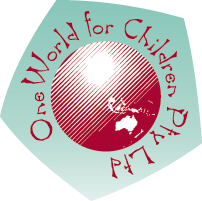Behaviour and Guidance
 Policy
Policy
At One World for Children staff use appropriate strategies to guide children to recognise, manage and reflect on their behaviours and express their emotions in positive, non-threatening and productive ways.
All children will be supported to learn and develop in a secure and empowering environment.
Relevant legislation and Standards
Education and Care Services National Law Act 2010: Sections 166, 167
Education and Care Services National Regulations 2011: Regulations 73, 74, 155, 156, 157, 168(2)(j)
National Quality Standard, Quality Area 5: Relationships with Children
Definitions
Adequate supervision: (In relation to this policy) supervision entails all children (individuals and groups) in all areas of the service, being in sight and/or hearing of an educator at all times including during toileting, sleep, rest and transition routines. Supervision contributes to protecting children from hazards that may emerge in play, including hazards created by the equipment used.
Adequate supervision refers to constant, active and diligent supervision of every child at the service. Adequate supervision requires that educators are always in a position to observe each child, respond to individual needs and immediately intervene if necessary. Variables affecting supervision levels include:
- number, age and abilities of children
- number and positioning of educators
- current activity of each child
- areas in which the children are engaged in an activity (visibility and accessibility)
- developmental profile of each child and of the group of children
- experience, knowledge and skill of each educator
- need for educators to move between areas (effective communication strategies).
Behaviour guidance: A means of assisting children to self-manage their behaviour. It differs from traditional ’behaviour management’ or ‘discipline’ which generally implies that an adult is ‘managing’ children’s behaviour or using punishment to control children. Behaviour guidance applies to all forms of behaviour, not just behaviours labelled as ‘negative’.
Behaviour guidance plan: A plan that documents strategies to assist an educator in guiding a child with diagnosed behavioural difficulties to self-manage his/her behaviour. The plan is developed in consultation with the Nominated Supervisor, educators, parents/guardians and families, and other professional support agencies as applicable.
Challenging behaviour: Behaviour that:
- disrupts others or causes disputes between children, but which is part of normal social development
- infringes on the rights of others
- causes harm or risk to the child, other children, adults or living things
- is destructive to the environment and/or equipment
- inhibits the child’s learning and relationship with others
- is inappropriate relative to the child’s developmental age and background.
Inclusion Support Facilitator (ISF): Employed by inclusion support agencies and funded by the Commonwealth Government to provide advice on inclusive practices in childcare services. ISFs also help services to access a range of practical support.
Preschool Field Officer (PSFO) Program: Early intervention outreach services that are universally available within state-funded preschools for any child with developmental concerns. The primary role of the PSFO Program is to support the access and participation of children with additional needs in preschool.
Behaviour and Guidance
At One World for Children, the behaviour and guidance techniques used by staff are designed to show children the utmost respect, and to assist them to develop skills to appropriately and successfully resolve conflicts and differences of opinion.
Our guidance of children’s behaviour will
- have due regard to appropriate age and stage expectations and individual temperaments, and will be positive and supportive
- not include subjection to psychological abuse
- not permit frightening methods of control and discipline to be used (timeout)
- not be associated with food (never is a child or infant to be 'force fed', or refused food as a form of discipline), rest, toilet training or isolation,
- ensure that a proper tone of voice is used at all times. Voices must not be raised nor abusive at any time and at all times be managed with respect
- encourage children to express themselves and their opinions
- allow children to undertake experiences that develop self-reliance and self-esteem
- maintain the dignity and the rights of each child at all times
- offer positive guidance and encouragement towards acceptable behaviour
- have regard to the cultural and family values, age, and the physical and intellectual development and abilities of each child being educated and cared for
- be warm, responsive and to develop trusting relationships with children that promote a sense of security, confidence and inclusion
- support each child to develop responsive relationships, and to work and learn in collaboration with others
- be positive and use respectful strategies to assist children to manage their own behaviour, and to respond appropriately to conflict and the behaviour of others
The Approved Provider (or delegate) is responsible for:
- ensuring educators, staff and parents/guardians are provided with a copy of the behavior and guidance Policy and comply with its requirements
- ensuring all staff are aware of the service’s expectations regarding positive, respectful and appropriate behaviour, and acceptable responses and reactions when working with children and families
- ensuring children are adequately supervised, that educator-to-child ratios are maintained at all times and the environment is safe, secure and free from hazards
- considering the size and composition of groups when planning program timetables to ensure all children are provided with the best opportunities for quality interactions and relationships with each other and with adults at the service
- ensuring educational programs are developed and implemented in accordance with an approved learning framework, that are based on the developmental needs, interests and experiences of each child, and take into account the individual differences of each child
- ensuring the educational program contributes to the development of children who have a strong sense of wellbeing and identity, and are connected, confident, involved and effective learners and communicators
- ensuring that educators provide education and care to children in a way that:
- encourages children to express themselves and their opinions
- allows children to undertake experiences that develop self-reliance and self-esteem
- maintains the dignity and the rights of each child at all times
- offers positive guidance and encouragement towards acceptable behaviour
- has regard to the cultural and family values, age, and the physical and intellectual development and abilities of each child being educated and cared for
- organising appropriate training for educators/staff to assist with the implementation of this policy
- ensuring educators and all staff members at the service who work with children are aware that it is an offence to subject a child to any form of corporal punishment, or any discipline that is unreasonable or excessive in the circumstances (National Law: Section 166)
- ensuring that procedures are in place for effective daily communication with parents/guardians to share information about children’s learning, development, interactions, behaviour and relationships
- informing the Approved Provider of any notifiable complaints or serious incidents (refer to Definitions) at the service
- ensuring educators and staff use positive and respectful strategies to assist children to manage their own behaviour, and to respond appropriately to conflict and the behaviour of others
- ensuring that individual behaviour guidance plans are developed for children with diagnosed behavioural difficulties, in consultation with educators, parents/guardians and families, and other professionals and support agencies
- co-operating with other services and/or professionals to support children and their families, where required
- maintaining confidentiality at all times
Eductors – Qualified and all other Educators guidelines and responsibilities
- give consistent, clear and coordinated messages to the children about their behavioural expectations, so that the children are not confused by different staff approaches
- keep the child busy be re-directing to other experiences
- talk to the child about feelings and consequences of their behaviour
- focus on the inappropriate behaviour not the child
- use positive language
- involve older children in setting their own limits
- present as good models of behaviour for the children and shall be encouraged to adopt the AECA code of ethics
- become familiar with stages of child development so you hold reasonable behavioural expectations. Some child behaviour may be displeasing for adults, but should be considered acceptable and age appropriate ie toddlers find it difficult to “share” or take into account other’s feelings
- delivering educational programs, in accordance with an approved learning framework, that are based on the developmental needs, interests and experiences of each child, and take into account the individual differences of each child
- delivering programs that develop a sense of wellbeing and identity, connection to community, and provide skills for lifelong learning in all children
- trust and respect the children in your care as unique and special, and recognise that each child’s behaviour is an expression of feelings or an attempt to meet immediate or underlying needs
- be aware of different parent behaviour expectations, as child rearing practices vary greatly from culture to culture
- take into consideration each child’s whole life situation when dealing with their behaviour, consulting regularly with parents
- communicate and work collaboratively with parents/guardians and families in relation to their child’s learning, development, interactions, behaviour and relationships
- provide adequate supervision of children at all times
Parents/guardians are responsible for:
- reading and complying with the Behaviour and Guidance Policy
- engaging in open communication with educators about their child
- informing educators/staff of events or incidents that may impact on their child’s behaviour at the service (e.g. moving house, relationship issues, a new sibling)
- informing educators/staff of any concerns regarding their child’s behaviour or the impact of other children’s behaviour
- working collaboratively with educators/staff and other professionals/support agencies to develop or review an individual behaviour guidance plan for their child, where appropriate.
Usage of Inappropriate Discipline Techniques
It is an offence to subject a child to any form of corporal punishment, or any discipline that is unreasonable or
excessive in the circumstances (National Law: Section 166)
Forms of abuse consistant with those stated below will lead to a staff disciplinary action:
- Inappropriate use of “time out”
- Placing a child in a confined space, or in a location in which eye contact with the staff member can not be maintained
- Shaking, smacking, biting, pinching or restraining a child
- Injurious lifting (eg by one arm)
- Shouting, abusive words or tone, labelling inappropriately
- Ignoring a child’s request
Behaviour Guidance Plans
When a child displays continuous unacceptable behaviour the Educator - Qualified will observe, monitor and record the child’s bahaviour while respectively and sensitively gathering information from the parents hopefully revealing some facts as to why the child is behaving in an unacceptable way.
The Educator – Qualified and Centre Co-ordinator will privately consult with the parents about the concerns and suggest to the parent that we work together for a positive, behavioural technique and develop a plan that is suitable for home and that can be followed through while the child is attending the centre.
Should the strategies be ineffective the Educator - Qualified with the Centre Co-ordinator and the director, develop a written behaviour guidance plan QF26 detailing specific strategies and time frames that staff will put into practice immediately. This behavior guidance plan will be discussed with the child’s parent/s.
Should the behaviour guidance plan be ineffective based on the time frames decided by the Educator - Qualified with the Centre Co-ordinator in consultation with the director, the parent is required to seek outside professional support. The Centre Co-ordinator will support the parent/s through this process.
If all behaviour guidance strategies have been exhausted and the child is demonstrating aggressive behaviour causing physical or emotional harm or distress to any child or staff member, the director will meet with the family to inform them that their child will be required to have some time away from the centre while outside professional experts are consulted.
Sources
Belonging, Being & Becoming – The Early Years Learning Framework for Australia:
Early Childhood Australia (ECA) Code of Ethics (2006):
Guide to the National Quality Standard,ACECQA: www.acecqa.gov.au
Guiding children’s behaviour in child care – a NCAC Factsheet for Families:
http://ncac.acecqa.gov.au/family-resources/factsheets/guiding_children's_behaviour.pdf
Inclusion and Professional Support Program (IPSP), Department of Education, Employment and Workplace
Relations, Australian Government:
Rothwell, Philip (2008), ‘Guiding Children’s Behaviour’, from Putting Children First, Newsletter of the National
Childcare Accreditation Council, 25 March, p16–18
Victorian Early Years Learning and Development Framework:
Victorian kindergarten policy, procedures and funding criteria, DEECD:
Consultation Weeks:
5th and 12th November 2012
Date Reviewed: 2 November 2012
Date for Review: November 2013





 One World for Children Acknowledgement of Country: Here is the land; Here is the sky; Here are my people and here am I. We give thanks to future, present and past; Ancestors and Elders and the connection that lasts. We acknowledge the Wathaurong people on whose land we learn and play; We promise to look after it every day. ©
One World for Children Acknowledgement of Country: Here is the land; Here is the sky; Here are my people and here am I. We give thanks to future, present and past; Ancestors and Elders and the connection that lasts. We acknowledge the Wathaurong people on whose land we learn and play; We promise to look after it every day. ©